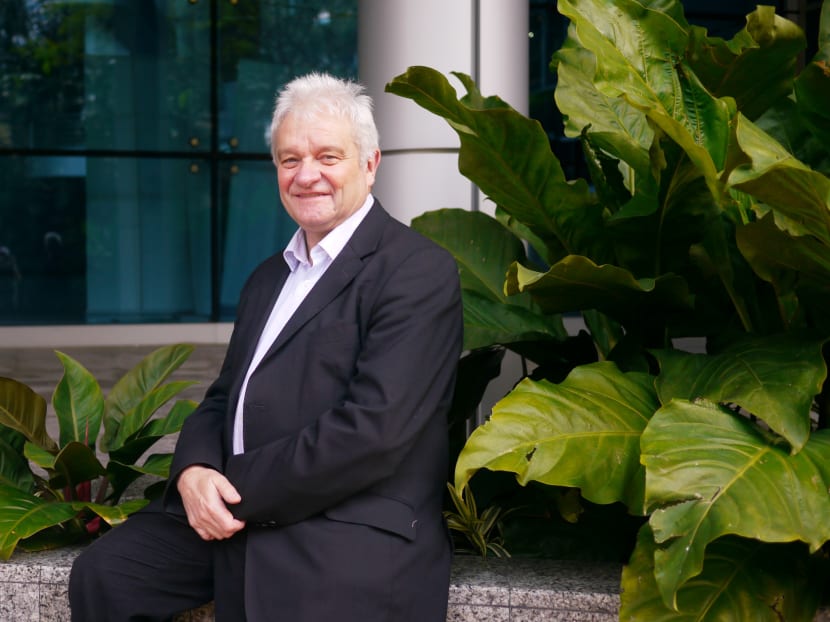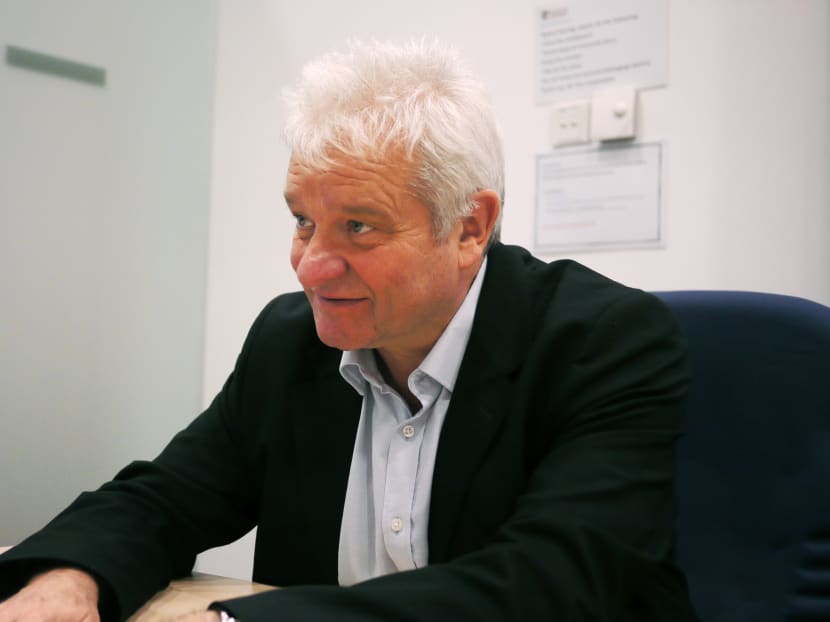Singapore's science scene is solid, but where's the creativity?: Nobel Laureate
SINGAPORE — “I’m a bit of an anarchist,” said Sir Paul Nurse, chuckling from across the table, a twinkle in his eye. The Nobel Laureate and President of the UK’s Royal Society is in Singapore to receive the Albert Einstein World Award of Science, held Wednesday night in Nanyang Technological University this year, and he’s taken some time out in his busy schedule to discuss the business of directing biomedical research. “I’m a great believer in the freedom of individuals,” he said.
SINGAPORE — “I’m a bit of an anarchist,” said Sir Paul Nurse, chuckling from across the table, a twinkle in his eye.
The Nobel Laureate and President of the UK’s Royal Society is in Singapore to receive the Albert Einstein World Award of Science, held on Wednesday night (Oct 2) in Nanyang Technological University this year, and he’s taken some time out in his busy schedule to discuss the business of directing biomedical research. “I’m a great believer in the freedom of individuals,” he said.
The statement seems slightly ironic coming from a scientist whose 2001 Nobel Prize in Medicine was for work that shed light on how the cell cycle is controlled and regulated. But he knows what he’s talking about. His career spans a wide number of distinguished positions, from Professor of Microbiology at the University of Oxford, Chief Executive Officer of the Imperial Cancer Research Fund and Cancer Research UK to the President of Rockefeller University in New York.
Currently, he is Director and Chief Executive of the Francis Crick Institute, a new multidisciplinary research institute in London that is slated to launch in 2015.
Our problem with approaches to research, he said, is trying a one-size fits all solution. There is a wide range of research in biomedicine: Some of it is application-driven, trying to solve very specific problems. But a lot of it is not.
“Activities that are very close to application can be controlled in a very top-down way. It’s very obvious what the problem is, it’s very obvious what you’re trying to solve, and the basic knowledge that’s needed is very clear. In that area it’s rather important that there is direction, there is investment in particular directions, and it can be top down control.”
But that only works if you know what you are doing, and there’s still a lot humankind doesn’t about our own biology, he said. Work to discover the unknown needs a freer hand. “Work at the other end, which is discovering new knowledge, should not be controlled in this top-down way, because it stifles the creativity and you tend not to know what you’re trying to find out. If you try to control it too much you won’t get anything very useful and you’ll waste money.”
For Singapore in particular, our small size presents additional challenges.
“I work and live in a biggish country, or a medium-sized country, and over time we’ll cover a lot of area. Singapore, population 5 million, cannot easily cover everything. So when I say give freedom in discovery and research, I can do that in the UK, but in Singapore, it does have to be a bit more directed,” he said.
So what can we do? Sir Paul taps into history, into an age where what we knew about the world was perhaps as little as what we know about our own bodies today.
“I use a metaphor,” he said, “a metaphor of a European explorer in the 19th century. A geographical society in a European country might decide it wants to sponsor an expedition fund, they might want to go to Antarctica. What the explorer society would do is to find the best explorer, equip them as best as they can, and then let them get on with it in Antarctica. They should not direct what they do in Antarctica. They don’t say, go up this valley, or go down that glacier.”
"That is the kind of balance between control and freedom that Singapore needs — identifying general areas of interest, then letting researchers find their own way through it."
This is also the principle he’s gunning for with the Francis Crick Institute (named after one of the discoverers of the structure of DNA). The institute will have about 1,500 scientists in 120 research groups, but no departments, and people are encouraged to form their own bottom-up interest groups to trade ideas.
“Rather than trying to get some senior committee of people like me deciding 'this is what we should do', which is the problem you’d be having if it’s too top-down, what I’m saying is let’s give freedom to the individual to work as if it’s discovery research, but provide a multidisciplinary environment, and capture things very effectively when they pop up.
“So you need more leadership, but not leadership in directing top-down what should be done. Leadership in identifying excellent people, really excellent people, who will perform, and provide a mechanism to capture it when it happens.”
BUILD UP SINGAPORE
Earlier this week TODAY ran a piece with a wide-ranging commentary from Mr Ngiam Tong Dow where, among other things, the former top civil servant lamented that Singapore’s biomedical research scene relied too much on trophy scientists as a key strategy. Sir Paul agreed: “Too often, trophy scientists who are well known in say, the US or Europe, will be offered a position and they will be coming here for a short period of time each year. And they will never settle. I do know examples of that in Singapore, and they are a waste of time.”
Getting talented scientists who are committed to Singapore to move here is excellent, he said, but “if they’re coming here and working here two weeks a year, or a month a year, and just getting money, usually it doesn’t work,” he said candidly. “There is a role for that sort of mature scientist but they have to move here.”
He also agreed with Mr Ngiam’s assessment that what Singapore need is to grow local talent. Singapore’s small size and relative isolation, he says, means that having home-grown talent is crucial. “It’s done extraordinarily well under the circumstances. But 5 million is half the size of London. And London, where I work now, is surrounded by another 50 million population in the UK, and another 300 million in Europe. We’re in a much better position to pool on other things.”
Singapore already has a good head start with a solid educational system, he said, but it seems to have a struggle with creativity, even in research.
“I think that in growing homegrown talent, you have to find the balance between the rigour of high-quality education that maybe is just a bit too much emphasis on learning, facts, and being able to deliver them, versus the creative side.
“There needs to be a balance in doing that, to build on the fantastic education system that delivers, to try to introduce ways to encourage creativity from the beginning, and also in research.”
He recounted his years running the Rockefeller University in New York. “Some years ago they had a scheme from Singapore where you went to the US, you worked there two, three years, then you had to come back and spend two, three years in Singapore. Now that didn’t work so brilliantly. People resented having to come back, you know, they didn’t like being controlled,” he said.
“I felt like that was a bit of a pity that it didn’t work — I had a lot of sympathy for the Singapore Government, what it was trying to do.” But the problem, he said, was that the scientists didn’t have a reason to come back, other than they were mandated.
His solution to that problem was to have joint programmes. “So the actual position is joint between a laboratory in Singapore and a laboratory in Rockefeller, or whoever’s running it. So that the person is actually in both places. And they work for one year in one place and one year in the next. So they have a natural magnet for Singapore, rather than you send them off without that tie to Singapore.”
But the most important thing, he said, is dialogue between the authorities and the scientists. “I think I would talk to (graduate students and post-doctoral researchers) and find out what is important to them. Because you want to build up Singapore.”










